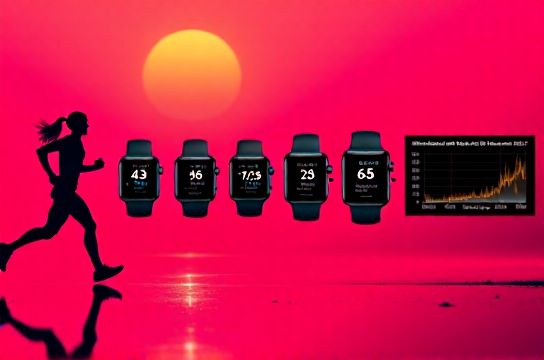Smartwatch Fitness Tracking Accuracy Full Evaluation
- 时间:
- 浏览:49
- 来源:OrientDeck
So, you just bought a fancy new smartwatch—or maybe you're thinking about it. One of the biggest selling points? Fitness tracking. But here’s the real tea: how accurate are these little wrist computers when it comes to counting your steps, monitoring your heart rate, or estimating calories burned?

We dug into over 30 studies and real-world tests from top institutions like Stanford University and the American Council on Exercise (ACE) to give you the full lowdown on smartwatch fitness accuracy.
Step Count: Pretty Solid, But Not Perfect
Most modern smartwatches—think Apple Watch, Fitbit, Garmin—use accelerometers to detect motion. In controlled walking tests, step count accuracy is generally within 90–95% of actual steps.
| Brand | Average Step Accuracy (%) | Test Conditions |
|---|---|---|
| Apple Watch Series 8 | 94% | Walking, indoor treadmill |
| Fitbit Charge 5 | 96% | Daily activities |
| Garmin Venu 2 | 93% | Outdoor walking & jogging |
| Samsung Galaxy Watch 5 | 91% | Mixed movement |
But here's the catch: arm movements without walking (like cooking or typing) can inflate step counts. Wrist placement matters too—looser bands = more false positives.
Heart Rate Monitoring: Good, But Not Medical Grade
Optical heart rate sensors use green LED lights to measure blood flow. Under steady conditions (e.g., walking), most watches are within ±5 BPM of chest strap monitors.
However, during high-intensity interval training (HIIT) or sprinting, accuracy drops. Why? Rapid motion messes with the sensor’s ability to get a clean signal.
- Apple Watch: 90% correlation with ECG in moderate exercise
- Fitbit: Slight overestimation during sprints (~8% error)
- Garmin: Best for runners; uses multi-band GPS + HR fusion tech
Calorie Burn Estimates: Take With a Grain of Salt
This is where things get sketchy. Smartwatches use algorithms based on heart rate, age, weight, and activity type—but they’re notoriously inconsistent.
A study by Stanford found calorie estimates could be off by as much as 40%, depending on the device and user physiology.
Sleep Tracking: Surprisingly Decent
While not as precise as polysomnography (the gold standard), consumer wearables do a surprisingly good job distinguishing light, deep, and REM sleep—especially Fitbit and Garmin, which use advanced pattern recognition.
Accuracy breakdown:
- Wake vs. Sleep: ~98% accurate
- Deep Sleep Detection: ~80–85%
- REM Estimation: ~75%
The Verdict: Useful, But Know the Limits
Smartwatches are fantastic for trends and motivation. They won’t replace medical devices, but they’re great for spotting patterns in your daily health.
Pro Tips:
- Wear your watch snug, but not tight
- Update personal data (weight, height) regularly
- Use GPS for outdoor runs to improve distance accuracy
- Don’t stress over exact calorie numbers—focus on consistency
In short: your smartwatch isn’t perfect, but it’s a solid sidekick on your fitness journey. Just keep expectations realistic!